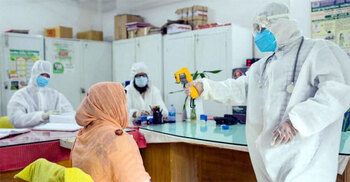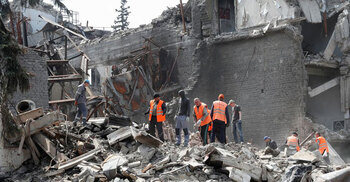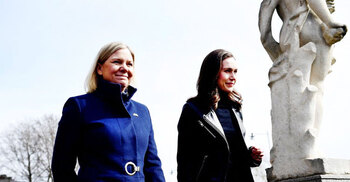UN chief embarks on Moscow trip amid criticism

UN Secretary-General Antonio Guterres will start a difficult three-day trip to Russia and Ukraine on Tuesday amid criticism for the limited role played by the United Nations in the management of the crisis.
Three months into the Russian invasion of Ukraine, UN agencies are struggling to reach civilians under siege in the east of the country, where humanitarian assistance is sporadic, reports Aljazeera.
Meanwhile the UN Security Council, where Russia is one of five permanent members with veto power, has failed to pass any resolutions condemning the war.
Guterres may want to use this trip to revitalise the UN initiative in the humanitarian field, experts said, while staying away from more controversial political questions.
“Guterres will try to provide a new momentum for the UN to play a role for humanitarian access in the evacuation of civilians, especially from Mariupol, and in a broader context to allow better access of UN and other humanitarian agencies to the conflict zones,” said Jean-Marc Rickli, head of Global and Emerging Risks at the Geneva Centre for Security Policy.
Guterres is due to meet in Moscow with Foreign Minister Sergey Lavrov and President Vladimir Putin. But the Secretary-General’s decision to kick off the first leg of his trip at the Kremlin has caused upset in Ukraine.
“From the outset this trip has started off on the wrong foot,” said Rickli. “In such a polarised environment where disinformation is so facilitated by social media, anything Guterres will do or say might be weaponised from one side or the other of the conflict.”
Last month, the UN’s refugee agency UNHCR came under fire by Ukrainian officials who accused it of being unprepared to address the humanitarian crisis. Similarly, the International Committee of the Red Cross (ICRC) was criticised for its alleged inaction and for visiting Russia. ICRC’s President Peter Maurer was in Moscow in a bid to negotiate access to the conflict areas.
In addition, the UN has also been sidelined diplomatically in the peace talks led by Turkey. Analysts said Guterres may wish to discuss the role the UN could provide in future peace talks with regard to UN infrastructure and services, especially in case of a future agreement where there could be peacekeeping forces deployed. Nevertheless, they agree it is premature to talk about peace.
“We should not expect any major breakthroughs out of this meeting, because the situation is not ripe for a compromise,” said Andrey Kortunov, the Director General of the Russian International Affairs Council.
UN weakness
Neither Russia nor Ukraine seem ready for serious negotiations.
Moscow has redeployed its forces to Ukraine’s east with the goal of the conquest and probable annexation of the Donbas region. Meanwhile, Ukraine has been emboldened by the success of its resistance movement since the Russians invaded on February 24.
“Mr Guterres is in a difficult position, because neither country is willing to hold peace talks,” said Rickli.
Meanwhile, Putin might want to use his meeting with Guterres to present Russia’s narrative on the invasion of Ukraine, which it has framed as a “special military operation” to the international community.
“He is likely to repeat his standard narrative about the roots of the conflict and he will try to justify his decisions,” Kortunov said.
“He might also complain about what he believes to be hypocrisy and double standards of the West.”
Putin and Guterres have very different views of the world and practice different leadership styles, Kortunov noted. Despite differences, however, Moscow has sanctioned Guterres’s election to the post, and the two men have good relations.
Last week, Guterres called for a ceasefire during Orthodox Easter that would allow for the safe passage of civilians from areas of current and expected confrontation in coordination with the ICRC. In addition, he called on the parties to allow for the delivery of life-saving aid to people in the hardest-hit areas such as Mariupol, the coastal city that has been besieged for weeks. His appeals were ignored.
Experts said the weakness of Guterres reflects the constraints of the structure he represents.
“In this environment for the UN to play a meaningful role in peacemaking is currently almost impossible. The UN’s weakness is a result of its very structure, notably the veto power of the permanent members of the UN Security Council which paralyses the organisation because of the ongoing polarisation between the West and the Russia-China axis.” Rickli said. Although China has called for peace talks, it has not condemned Russia’s actions in Ukraine.
According to the UN, more than 12 million people need humanitarian assistance in Ukraine, of whom more than one-third are in Mariupol, Kherson, Donetsk and Luhansk. The UN says this figure is due to increase to 15.7 million, about 40 per cent of all Ukrainians still left in the country, if the conflict continues.
Despite constraints on the ground, the UN says some 2.5 million people have been provided with assistance in the past seven weeks, including many in the east.
According to Shabia Mantoo, spokesperson at the UNHCR, about 4.9 million refugees have fled Ukraine since February 24. Bhanu Bhatnagar of the World Health Organization said the body has delivered 218 tonnes of emergency and medical supplies to Ukraine and roughly two-thirds of that, about 132 tonnes, have reached their intended destinations in the east and north of the country.
Jakob Kern, World Food Programme emergency coordinator for Ukraine, said Mariupol would probably need about two to three trucks a day of food alone. At the moment, the agency has been able to send in 10 trucks a month.







